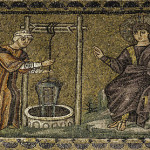We run our website the way we wished the whole internet worked: we provide high quality original content with no ads. We are funded solely by your direct support. Please consider supporting this project.

Violent Parables?
Some try to argue that Jesus did not make loving enemies and refraining from violence an absolute mandate. They make their case on the basis of several passages from the Gospels. The first concerns the cleansing of the temple which we addressed here, while the second is about how Jesus spoke harsh words to the Pharisees, which was covered here.
A third argument cites several eschatological parables of Jesus to argue that he believed God would act violently in the final judgment. A classic example is the parable of the unforgiving servant (Mt 18:21-35). Jesus begins this parable by comparing “the kingdom of heaven” to “a king who wanted to settle accounts with his servants” (v. 23). One servant owed him “ten thousand bags of gold” (talents, v. 24), and it’s helpful to note that each talent was the equivalent of what a servant would typically earn over twenty years. The servant of course could not pay the king, so the king intended to sell off everything the servant owned and to sell his family into servitude. Yet the servant pleaded with the king for “patience,” promising to eventually “pay back everything” (vv. 25-6). As a result, this king “took pity on him” and not only postponed payment, but “canceled the debt” altogether (vv. 27).
Soon afterward this servant encountered a fellow servant who happened to owe him “a hundred silver coins” (denarii), which was the equivalent of what a servant would typically earn over a hundred days. In other words, it was much smaller than the amount he had been forgiven. He “grabbed” and “began to choke” this servant as he commanded him to “[p]ay back what you owe me” (v. 28). Though this man begged him for patience, the servant that had been forgiven ten thousand talents had him “thrown into prison until he could pay the debt” (v. 30). When word got back to the king about his actions, he angrily reminded him that he should “have had mercy on your fellow servant just as I had on you…” (v. 33). He consequently “handed [the servant] over to the jailers to be tortured, until he should pay back all he owed” (v. 34). And then Jesus concludes; “This is how my heavenly Father will treat each of you unless you forgive brother or sister from your heart” (v. 35).
Does this parable suggest that Jesus believed God will violently judge unforgiving people at the end of time? Five considerations lead me to believe that this is unlikely.
First, it is very difficult to reconcile the conception of God intentionally having people tortured until they can pay back their debt with Jesus’ other teachings about the nature of God. For example, Jesus instructs disciples to never retaliate, to love, bless and do good to enemies, and to NOT demand payment from others. And he tells them that only when they love like this can they be considered “children of the Father in heaven,” for this is how the Father loves. He loves and blesses indiscriminately — like the sun shines and like the rain falls (Mt 5:39-45; Lk 6:27-36). On the assumption that Jesus didn’t contradict himself, teachings like this should incline us to look for interpretations of this parable that don’t ascribe violence to God.
Second, there is always an “is” and “is not” quality to parables, and the key to discerning the point of any parable is to correctly apply this distinction. For example, in Jesus’ parable about the persistent widow and the unjust judge (Lk 18:1-8), everything depends on our understanding that the point is to teach us to pray like a desperate and persistent widow, not to teach us that the God we pray to is an unjust judge. In the same way, the central point of this parable is to teach the urgency of forgiving others in light of how much we have been forgiven and that refusing to do so brings about dire consequences. But I believe we should be hesitant to draw theological conclusions about HOW God will allow these consequences to be brought about, especially when they contradict other things Jesus teaches about God, as I said above.
Third, parables typically set up the intended point by telling stories based on things the audience is familiar with, including, as in the parable we’re discussing, the brutal and unjust behavior of authorities towards Jewish peasantry. The parable we are discussing builds on everyone’s familiarity with servants being hopelessly indebted to authorities that could call in debts at any time and imprison them and sell off everything they owned, including their families, when they could not pay. The harsh way the king in this parable, turning the servant he once forgave over to torturers, is a case in point. But this does not mean that Jesus condoned this behavior, let alone that he thought God acts like this. To the contrary, Jesus as well as his audience deplored the cruel political system that oppressed them.
Fourth, while building on familiarities, Jesus’ parables often incorporated absurd elements intended to shock the audience. In the parable we are discussing, for example, no servant could possibly incur or pay off a debt of ten thousand talents – the equivalent of two hundred thousand years of labor! Still less could a king hope to collect such a debt by having the indebted servant tortured in prison! Even more shocking to the original audience, however, is the suggestion that a king would ever have “mercy” on a servant by cancelling such an absurd debt! Similar to the way the punch line of a joke functions, the surprise was intended to help impress the lesson of the parable on people’s imagination.
It seems apparent that these absurdities are intended to drive home the central point of this parable, which is that we have been forgiven an incomparably large debt we could never repay and that we must extend this same mercy to others. Yes, this parable also includes a warning about the the dire consequences of refusing to forgive others. But the absurd imagery of a king thinking he could collect on the absurdly large debt he had just forgiven by having a man tortured is premised on the character of kings that Jesus’ audience were familiar with, not on the character of God.
Finally, in my forthcoming “Crucifixion of the Warrior God,” I demonstrate that the dominant way God judges sinners through Scripture is by withdrawing his merciful protection and allowing people to suffer the harmful consequences that are intrinsic to their sin. As it says in Ps 7:14-16:
Whoever is pregnant with evil
conceives trouble and gives birth to disillusionment.
Whoever digs a hole and scoops it out
falls into the pit they have made.
The trouble they cause recoils on them;
their violence comes down on their own heads.
In this light, even if someone believes we should see some significance in the heavenly Father “handing over” the unforgiving servant to tormentors in the parable we’re addressing, I submit it should be along these lines. If someone will not repent of their unforgiving heart, the Father will allow them to suffer the negative consequences that are intrinsic to their sin. “In the same way you judge others,” Jesus said, “you will be judged, and with the measure you use, it will be measured to you” (Mt 7:2).
In light of these considerations, I can only conclude that we are misreading this parable if we use it to overturn Jesus’ teaching, and his example, of God’s altogether non-violent nature.
Photo credit: Sky Noir via VisualHunt.com / CC BY-NC-ND
Category: General
Tags: God's Character, Jesus, Non-Violence, Parables
Topics: Enemy-Loving Non-Violence
Related Reading

Podcast: Is There a Moral Difference Between Killing and Murder?
Greg argues against C.S. Lewis’ claim that not all killing is murder. http://traffic.libsyn.com/askgregboyd/Episode_0223.mp3

A Foolish and Weak-Looking God
The New Testament assumes that the God of Israel and the God revealed in Jesus Christ are one and the same God. But there also can be no question that the portrait of God that was unveiled when the Messiah arrived on the scene was in some respects quite different from what the OT had…

God is Different Than You Think
The revelation of “[a] God humiliated even unto the cross,” as Pascal put it, flies in the face of what most Jews of Jesus’ time, and of what most people throughout history, have expected God to be. In this light, we can discern the thematic centrality of the cross in Jesus’ many teachings that reverse…

Living Incarnationally
The Christian faith is centered on the belief that in Jesus Christ God became a human being. This is commonly referred to as the doctrine of the incarnation. It means that in Jesus, God became embodied. God left the blessed domain of heaven, was born in Bethlehem, and took on our humanity that we might…

The Forgotten Heart of King’s Dream
Every year Shelley and I attend the annual Dr. Martin Luther King Jr. Breakfast with some friends. As you might have expected, there was an excitement in the room this year that was unlike anything we’ve witnessed in the past. Tomorrow we will witness what is undoubtedly the most remarkable achievement of King’s dream as…

Thank You Obama for Denouncing “Christian” Violence: It is Actually Far Worse Than ISIS
Picture Credit: Official White House Photo by Pete Souza It seems some conservative Christians are up in arms because of something Obama said at the National Prayer Breakfast yesterday. After condemning ISIS and religiously-motivated violence in general, the president added: Lest we get on our high horse and think this is unique to some other…
